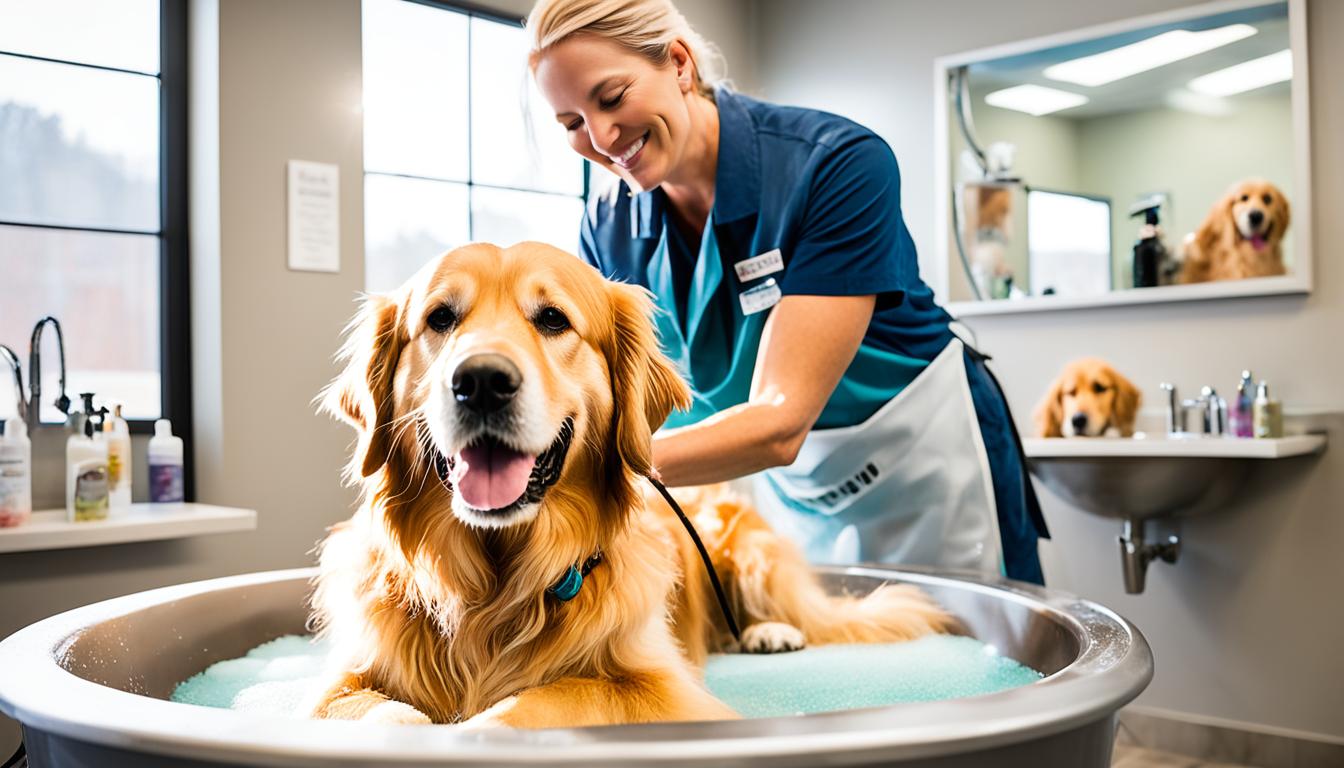Foxglove poisoning in dogs can be risky as the plant contains harmful cardiac glycosides. Symptoms include nausea, tremors, and possible collapse. It affects the heart directly, causing issues. All parts of the plant are toxic. If ingestion is suspected, immediate vet attention is vital. Signs like vomiting, drooling, and abnormal heart rate indicate toxicity. Severe cases may lead to seizures and electrolyte imbalances. Treatment should be prompt to counteract effects. Awareness of symptoms and quick action are key. Discover more about foxglove poisoning risks and treatment to safeguard your furry friend's health.
Key Takeaways
- Foxglove contains cardiac glycosides harmful to dogs.
- Symptoms include cardiac arrhythmias, vomiting, and weakness.
- Immediate vet attention increases recovery chances.
- All parts of the foxglove plant are toxic to dogs.
- Prompt recognition and treatment are crucial for recovery.
Foxglove Poisoning: Understanding the Risks
Understanding the risks of foxglove poisoning in dogs is essential for pet owners to recognize potential symptoms and seek immediate veterinary care. Foxglove contains substances like digitalis, which are cardiac glycosides and potentially harmful to dogs. These compounds can have a serious impact on a dog's health, especially their heart.
If a dog ingests any part of the foxglove plant, it can lead to symptoms such as nausea, tremors, and even collapse. The toxins in foxglove directly affect the heart, potentially causing cardiac issues and abnormalities in heart rhythm and rate.
It's important to remember that all parts of the foxglove plant are considered toxic to dogs, so caution should always be exercised. If you suspect that your dog has ingested foxglove, immediate veterinary attention is crucial to guarantee the best possible outcome. By being aware of the dangers posed by foxglove and acting promptly, we can help protect our furry friends from harm.
Signs of Foxglove Poisoning in Dogs

As we examine the signs of foxglove poisoning in dogs, it's important to watch out for symptoms such as nausea, vomiting, and drooling.
If your furry friend displays dilated pupils, abnormal heart rate, or tremors, it could be a sign of severe toxicity.
Symptoms in Poisoned Dogs
When dogs are poisoned by foxglove, they may exhibit symptoms such as nausea, drooling, and vomiting. Other signs of toxicity include dilated pupils and abnormal heart rate or rhythm, indicating significant cardiac problems.
In severe cases, tremors, seizures, and collapse can occur due to foxglove poisoning. Additionally, this toxicity can lead to electrolyte abnormalities and gastrointestinal issues in poisoned dogs.
It's important to recognize these symptoms promptly and seek veterinary care to manage and treat foxglove poisoning effectively. Remember, early intervention is vital in ensuring the well-being and recovery of your beloved pet.
Immediate Veterinary Care
If a dog shows signs of foxglove poisoning, immediate veterinary care is essential to guarantee prompt treatment and prevent further complications. Foxglove contains cardiac glycosides that can lead to serious cardiac issues in dogs, making it a medical emergency.
Symptoms such as nausea, vomiting, tremors, and irregular heart rate shouldn't be taken lightly. Seeking professional help right away is crucial to safeguard the well-being of your pet.
Veterinarians have the expertise to provide the necessary care and intervention to counteract the effects of foxglove poisoning. Remember, quick action can make a significant difference in the outcome, potentially preventing long-term consequences.
Potential Long-Term Effects
Long-term exposure to foxglove poisoning in dogs may result in heart rhythm abnormalities as a consequence of the toxic effects of cardiac glycosides. These abnormalities can lead to serious cardiac issues and affect the overall health of the dog.
Additionally, chronic exposure to foxglove toxins can disrupt electrolyte balances in the body, further exacerbating the cardiac problems. It's important to monitor dogs who've been exposed to foxglove over an extended period for signs of cardiac distress and electrolyte imbalances.
If left untreated, these long-term effects can have lasting implications on the dog's health, potentially causing irreversible damage to the heart and other vital organs. Regular veterinary check-ups and prompt intervention are essential in managing the consequences of foxglove poisoning in dogs.
Immediate Actions for Foxglove Ingestion

If your dog swallows foxglove, make them vomit immediately to stop the toxins from spreading.
Then, get in touch with a vet or a poison control hotline for further advice.
Keep a piece of the plant for identification so that the vet can treat your pet accurately.
Induce Vomiting Promptly
Promptly inducing vomiting after foxglove ingestion is a crucial step to expel the toxins from your dog's system. By acting swiftly, you can help prevent the absorption of dangerous cardiac glycoside toxins found in foxglove plants. If your dog ingests foxglove, contact a veterinarian as soon as possible for guidance on induced vomiting.
This immediate action can aid in removing the harmful substances before they cause serious harm. Vets may recommend methods to safely induce vomiting either at home or in a clinical setting. Remember, promptly inducing vomiting is an essential initial step in treating suspected foxglove ingestion in dogs, helping to reduce the risk of severe symptoms and complications associated with foxglove toxicity.
Seek Vet Assistance
Upon suspecting foxglove ingestion, immediate veterinary assistance should be sought to ensure prompt and appropriate treatment for your pet. Contacting a vet is essential as they can provide the necessary care tailored to your dog's situation.
Inform the vet about the toxic plant ingested, aiding in accurate diagnosis and treatment planning. Quick action is important in cases of plant toxicity, and seeking professional help increases the chances of a positive outcome.
If unsure, contacting a poison control helpline or local veterinarian for guidance is recommended. Remember, the safety and well-being of your furry companion are a top priority, so don't hesitate to reach out for help when dealing with potential plant poisoning incidents.
Monitor Heart Rate
Monitoring your dog's heart rate closely is vital when suspecting foxglove ingestion due to its potential to cause abnormal rhythms. Foxglove plants contain compounds that can disrupt the heart's normal function, leading to dangerous cardiac arrhythmias. Symptoms of foxglove poisoning may include an irregular or slow pulse, signaling a need for immediate action.
If you notice any concerning changes in your dog's heart rate, contacting your veterinarian right away is essential. Veterinary intervention is necessary to assess the severity of the situation and provide appropriate treatment.
Veterinary Diagnosis for Foxglove Poisoning

When diagnosing foxglove poisoning in dogs, the first essential step is conducting a thorough physical examination. This includes observing for symptoms like vomiting, diarrhea, irregular heart rate, and changes in behavior.
Blood work, such as a complete blood count and chemistry panel, is vital for further evaluation. A urinalysis may also be performed to assess kidney function, especially in cases of suspected foxglove poisoning. Additionally, an electrocardiogram (ECG) might be necessary to monitor the dog's cardiac function closely.
If you suspect your dog has ingested Digitalis purpurea, a plant containing cardiac glycosides like foxglove, bringing a sample of the plant to the veterinarian can aid in the accurate diagnosis. These diagnostic tests help veterinarians determine the extent of poisoning and tailor the treatment plan accordingly.
Treatment Options for Foxglove Poisoning

To address foxglove poisoning in dogs, veterinarians typically administer activated charcoal to help absorb toxins. This process involves giving the dog activated charcoal orally, which binds to the toxins in the stomach and intestines, preventing them from being absorbed into the bloodstream. Additionally, intravenous fluids are important in treating foxglove poisoning as they help correct electrolyte imbalances that may occur due to the toxic effects of the plant. These fluids provide essential hydration and support organ function during the recovery process.
Supportive therapy plays an essential role in the treatment of foxglove poisoning in dogs. This involves monitoring the dog closely, providing a quiet and comfortable environment, and offering care to alleviate symptoms such as vomiting, diarrhea, or irregular heartbeats. In severe cases, additional medications like antiemetics (to control vomiting) and anti-seizure drugs may be necessary to manage the dog's condition effectively. Blood work is crucial in guiding treatment decisions and ensuring the dog receives the appropriate care to recover from foxglove poisoning.
Recovery Process After Foxglove Poisoning

After foxglove poisoning in dogs, the recovery process is dependent on the amount ingested and the timeliness of treatment received. Foxglove is highly toxic to dogs, and even a small amount consumed can lead to severe symptoms. In cases of foxglove poisoning, hospitalization may be necessary until the effects of the plant toxin subside.
Close monitoring by veterinary professionals is vital during this time to guarantee the dog's well-being. Follow-up vet visits are essential to track the progress of recovery and address any lingering issues. To aid in the recovery process, it's important to prevent further exposure to foxglove.
Creating a safe environment free of this toxic plant is key to avoiding future incidents of poisoning. By educating ourselves on plants that are harmful to dogs and taking proactive measures, we can help our furry friends recover fully and prevent similar emergencies in the future.
Preventing Foxglove Poisoning Incidents

To protect our pets from foxglove poisoning incidents, it's important to keep foxglove plants out of their reach. Foxglove contains a toxic substance known as cardiac glycoside, which can be harmful if ingested by dogs.
To prevent such occurrences, follow these steps:
- Identify Parts of the Plant: Learn to recognize foxglove by its tubular flowers that can be various colors like pink, purple, white, or yellow. The leaves are large, veined, and can be light green or gray-green.
- Secure Plant Placement: Place foxglove plants in hanging baskets or high shelves where pets can't access them. Make sure that your garden is pet-friendly by keeping toxic plants away from areas where they roam freely.
- Pet Poison Helpline Contact: Keep the Pet Poison Helpline number handy (add number here) in case of emergencies. Immediate veterinary assistance is vital if you suspect your pet has consumed any part of the foxglove plant.
Educating Pet Owners on Foxglove Dangers

Educating pet owners about the dangers of foxglove is vital in preventing accidental ingestions by their dogs. Foxglove contains cardiac glycosides, which are highly toxic to dogs and can lead to severe health issues like cardiac arrhythmias, vomiting, diarrhea, weakness, and in extreme cases, death.
By understanding the toxic nature of foxglove plants, pet owners can take proactive steps to guarantee their dogs' safety. It's essential to familiarize yourself with the symptoms of foxglove poisoning, such as irregular heartbeats and gastrointestinal distress, to act promptly in case of ingestion.
Immediate veterinary attention markedly increases the chances of a dog's recovery from foxglove poisoning. As responsible pet owners, it's our duty to prioritize our furry companions' well-being by keeping foxglove plants out of reach and being watchful when outdoors.
Frequently Asked Questions
What Happens if Dog Eats Foxglove?
If a dog eats foxglove, it can experience symptoms like nausea, vomiting, and abnormal heart rate. Foxglove contains toxins that can lead to serious cardiac issues in pets.
The entire plant is toxic to dogs, posing a danger if ingested. Immediate veterinary care is essential to prevent severe complications.
Foxglove poisoning in dogs must be treated as a medical emergency due to the potentially fatal consequences.
What Are the Side Effects of Foxglove Poisoning?
When foxglove poisoning occurs in dogs, symptoms can be severe. Nausea, vomiting, dilated pupils, and abnormal heart rate are common. Dogs may also experience tremors, seizures, and drooling.
Ingesting foxglove can lead to dangerously high potassium levels, posing a life-threatening situation. Immediate veterinary care is crucial to manage these side effects and prevent serious complications.
Seek help promptly if you suspect foxglove poisoning in your dog.
What Happens if You Smell Foxglove?
Smelling foxglove is generally not dangerous for dogs. Simply inhaling its scent doesn't typically lead to poisoning.
The primary concern with foxglove toxicity in dogs arises from ingesting the plant, not from smelling it. Ingestion, rather than inhalation, poses the greatest risk of poisoning for our furry companions.
It's important to keep foxglove out of reach to prevent accidental ingestion by our four-legged friends.
Is There an Antidote to Foxglove?
There isn't a specific antidote for foxglove poisoning. Treatment focuses on managing symptoms and preventing complications.
Activated charcoal might be used to absorb toxins from the digestive system. Intravenous fluids help correct electrolyte imbalances.
Additional medications like antiemetics and anti-seizure drugs could be given as needed. It's important to seek immediate veterinary care if you suspect your dog has ingested foxglove.
Conclusion
To sum up, just like the stunning yet lethal foxglove flower, the risks of foxglove poisoning in dogs shouldn't be underestimated.
It's crucial for pet owners to be mindful of the signs of poisoning and take prompt action if ingestion occurs.
By educating ourselves and taking precautionary measures, we can guarantee the safety and well-being of our furry companions.
Remember, knowledge is the secret to keeping our pets safe from potential hazards.









